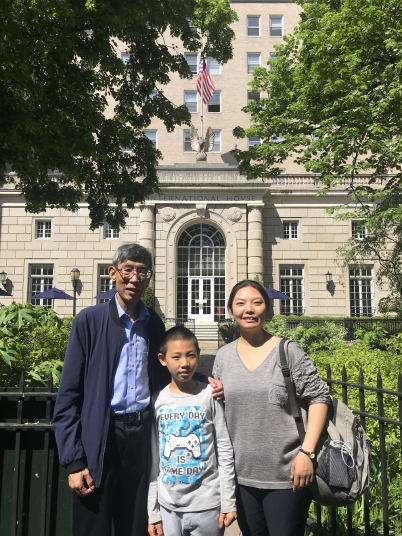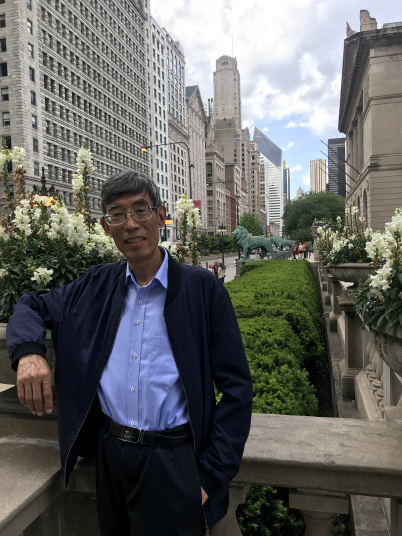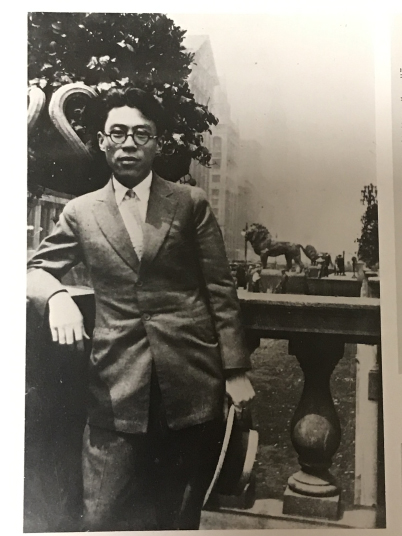| Lifestyle |
| An Unfaded Legacy | |
| A late poet's great granddaughter retraces his footsteps in the U.S. to find a continued link | |
|
|
 Wen Liming (left), Wen Ting (right) and her son at the International House in New York in 2019, It is where Song of Seven Sons was written (COURTESY PHOTO)
When Wen Ting walked into the International House in New York City for the first time in 2018, she felt a spiritual connection with her great grandfather Wen Yiduo, who used to live on the ninth floor of the building 95 years ago. Wen Yiduo (1899-1946), one of the prominent poets in early 20th century China, was among the students chosen by the government in 1922 to pursue fine arts and literature in the U.S. He went to Chicago first but his last stop in the U.S. was the Art Students League in New York, a private art school. While studying there, he lived in the International House, a community of students and scholars from different countries, and with his friends, created history by holding the first Peking Opera performance there. The performers were Chinese students, and Wen was responsible for the stage design and art. It was 1924, and the Rockefeller family came to watch the performance.  Wen Liming in Chicago in 2019 (COURTESY PHOTO)
A dream come true Ninety-five years later, his great granddaughter Wen Ting followed in his U.S. footsteps. As an assistant professor teaching Chinese to international students at Beijing Language and Culture University, she was chosen for an exchange program. Offered an assignment to teach Chinese at Columbia University for two years, she said yes with alacrity, finding it a dream opportunity, both for her research on Chinese teaching, and also to fulfill a family dream, tracing the history of her great grandfather's sojourn in the U.S. "I had heard so many stories about Wen Yiduo! Since I had a chance to work in the city where he used to live, I wanted to find out the untold story myself," she said. In a serendipitous discovery, when Wen Ting started teaching at Columbia University, she found it was a walking distance from the International House. "I was so excited the first time I walked there. I thought my great grandfather must have taken the same route when he was here," she said. Wen Ting never met him, nor did her father. Wen Yiduo was assassinated in 1946 when he was only 46. At that time, Wen Ting's grandfather was less than 18 years old. "My father Wen Liming is a researcher on history. Wen Yiduo is one of his most important subjects, not only as a family member but also as a figure of modern Chinese history," Wen Ting said. "We planned that my father would come to the U.S. during my stay so that we would together trace Wen Yiduo's life while living and studying in the U.S." It took Wen Yiduo a 17-day journey by sea to arrive in Seattle from Shanghai on August 1, 1922. He wrote some poems during those 17 days, one of them inspired by a shining star he saw from his ship. It took another seven days to reach Chicago by train, where he attended the Art Institute of Chicago. "From his letters to his family and friends that we collected, we found that he changed his address five times in Chicago as it cost less to live farther and farther from the college," Wen Liming said while giving a talk about Wen Yiduo at the Renwen Society at the China Institute based in New York City, a non-profit organization working to create cross-cultural understanding. Wen Ting and Wen Liming started retracing their illustrious ancestor's footsteps in the U.S. in June 2019. Chicago was their first stop. With the addresses on the old letters, they went to all the five places. One of them was Snell-Hitchcock, a residential hall at the University of Chicago built in 1893 that is on the U.S. National Register of Historic Places. They even found the room Wen Yiduo used to live in, though the room number had changed. "The student currently living in the room let us come in and take photographs," Wen Ting said. After Chicago, the Wens traveled to Colorado Springs, a city in the state of Colorado at the foot of the Rocky Mountains, where Wen Yiduo had transferred to Colorado College in 1923. They found some rare documents in the college library, including the yearbook, the enrollment name list, and an issue of the college newspaper with a group photo of Wen Yiduo and other Chinese students. "I found a lot of important documents and materials that we never expected to see, especially at the Art Institute of Chicago archives and Colorado College library," Wen Ting said. "It means a lot to my family and my research."  Wen Yiduo in Chicago in 1922/1923 (COURTESY PHOTO)
Coming full circle Wen Yiduo's deep love for Chinese culture as well as some experience of discrimination he faced in the U.S. made him a passionate promoter and defender of Chinese culture there. He participated in establishing the Dajiang Society in the U.S., a nationalist Chinese student organization. He returned to China in 1925, though as per regulations, he could have studied in the U.S. for five years, and he never went back. He took up a teaching post at Tsinghua University and in 1937, when the Japanese invaded Beijing, he and many other intellectuals migrated to Kunming, Yunnan Province, in the southwest, where they continued to teach and research at the National Southwestern Associated University, an association formed by three major universities during the Japanese aggression, Peking University, Tsinghua University and Nankai University, to continue education despite the bombings and killings. In 1944 he supported the China Democratic League in Kunming, a non-Communist political party of intellectuals, and wrote a series of essays criticizing the corruption in the then Kuomintang government. He made his last public speech in Kunming on July 15, 1946, when he spoke at the funeral of his friend Li Gongpu, a writer who was assassinated by the ruling Kuomintang. On the same day, soon after his powerful speech, Wen Yiduo was assassinated by Kuomintang secret agents. The last speech was widely broadcast and became part of Chinese students' textbooks for generations. "For my classmates, the text showed a heroic man's courage in modern Chinese history. For me, it was about family history," Wen Ting said. "I was asked to read a paragraph from the speech in public and I remember I was so nervous and careful not to make any mistake." Wen Yiduo has a memorial statue on the campus of the Yunnan Normal University in Kunming. Though his work as a poet rests mainly on two volumes, Red Candle and Dead Water, his legacy lives on. In March 1925, before he went back to China, he wrote Song of the Seven Sons, a set of seven nationalistic poems likening the seven areas China had ceded to other countries to seven children separated from their mother. They included Macao, which returned to the motherland in 1999 and is today the flourishing Macao Special Administrative Region. The poem was set to music in 1997 by composer Li Haiying and became the theme song of the celebration of Macao's return. In December 2019, during the celebration of the 20th anniversary of the reunion, the birth of the song was one of the themes of a commemorative exhibition showing Tsinghua University's links with Macao. Wen Ting was invited to the exhibition. "My family members are proud to be Wen Yiduo's descendants," a moved Wen Ting said. "His passion for national integrity and patriotism are the most valuable treasures we inherited from him." Copyedited by Sudeshna Sarkar Comments to zhaowei@bjreview.com |
|
||||||||||||||||||||||||||||
|